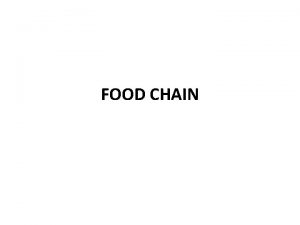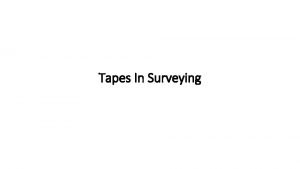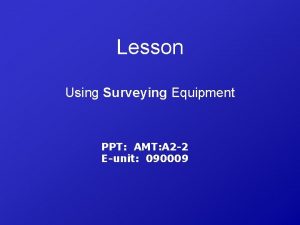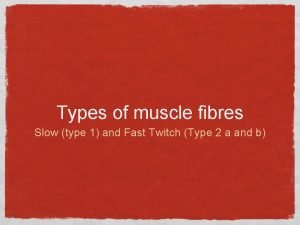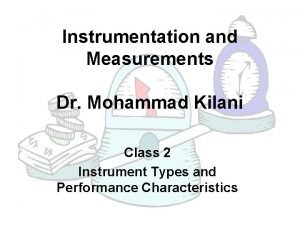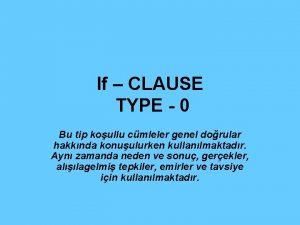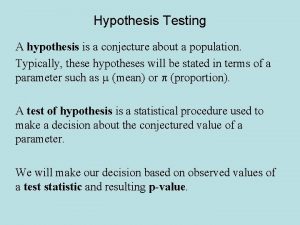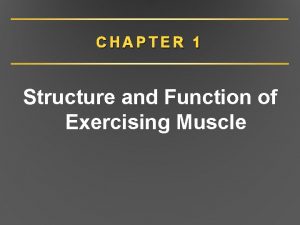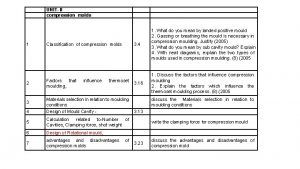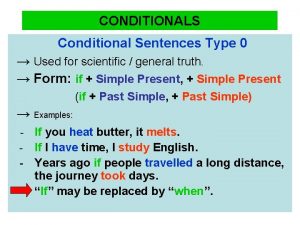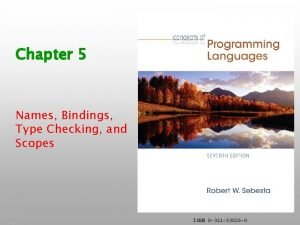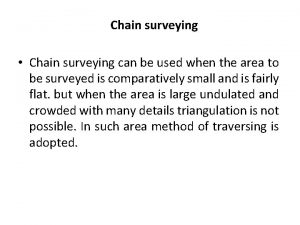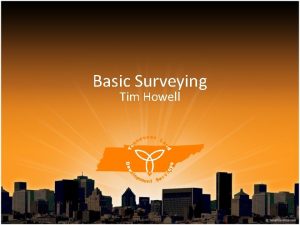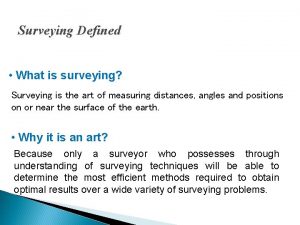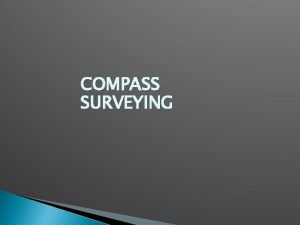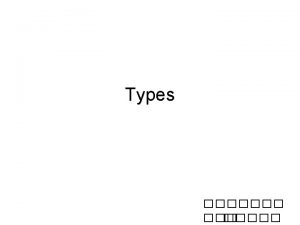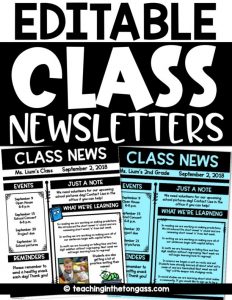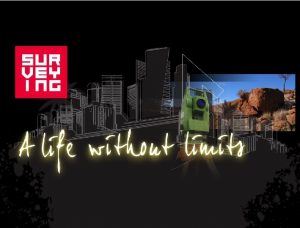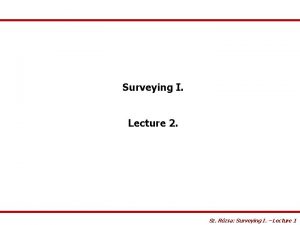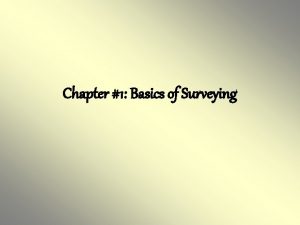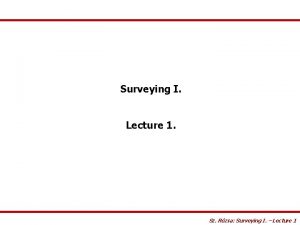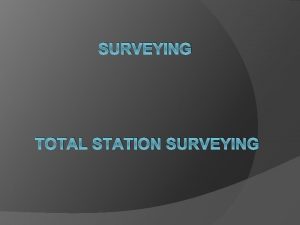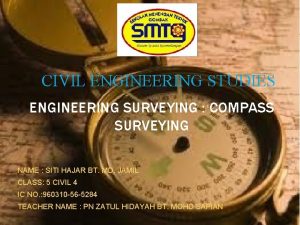Chain Surveying Chain surveying is a simpllest type























- Slides: 23

Chain Surveying: Chain surveying is a simpllest type of survey in whice is divided into a number of well condition tringles and only linner measurments are ment in the field When suitable 1. When the sourface is more or less level 2. A small area is to be surveyed 3. A small scale map is to be prepared 4. The formation of well-conditioned triangles is easy When unsuitable 1. The area is too large 2. The area is consists of too many undulations 3. The area is crowded 4. The formation of well-conditioned triangles is not easy

Large scale map: when 1 cm of a map represent a small distance. it is said to be a large scale map. Having an RF less than 1/500. Small scale map: when 1 cm of a map represent a large distance. it is said to be a small scale map. Having an Rf more than 1/500.

Well conditioned triangles A triangle is called well-conditioned triangle when no angle in it is less than 30 degree or large than 120 degree. Ill conditioned triangles A triangle is called ill-conditioned triangle when a angle is less than 30 degree or a angle is large than 120 degree.

Survey stations Main stations Subsidiary stations Tie stations

Survey stations The biggining and the end points of the chain line are called survey stations. 1. Main stations. which stations are taken along the boundary of an area as controlling points are known as main station. 2. Subsidiary stations. Which stations are taken on the main survey lines or other chain line are known as subsidiary station. 3. Tie stations. Which stations are taken on the main survey lines are known as tie stations.

Base line: The line on which framework of the survey is build is known as base line. Check line: The line which is used for Checking the accuracy of the triangle is called Check line. Offsets: Offsets is the lateral shortest distance of an object measured from a survey line.

Parpendicular offsets Oblique offsets

Perpendicular Offsetes: The parpendicular shortest distance of an object measured from a survey line is called parpendicular offsetes. Oblique Offsetes: The oblique shortest distance of an object measured from a survey line is called oblique offsetes.

Ways of taking parpendicular offsets 1. By setting a parpendicular by sawing a tape from the object to the chin line. 2. By setting a right angle in the ratio 3: 4: 5. 3. By setting a right angle by tri-square. 4. By setting a right angle by optical-square.

RUET Whey perpendicular offsets are preferred 1. They can be taken very quickly 2. The progress of the survey is not hampered 3. The entry in the field book becomes easy 4. The plotting of the offsets also becomes easy

Number of offsets 1. When the boundary of the object is approxiomately parallel to the chain line, parpendicular offsets are taken at regular intervals.

Number of offsets 2. When the boundary is straight, parpendicular offsets are taken at both ebds of it.

Number of offsets When the boundary of the object is circular, parpendicular offsets are taken at regular intervales.

Number of offsets When the boundary of the object is zigzag, parpendicular offsets are taken at every bend point.

Number of offsets When road cross the chain line parpendicularly, the chainage of the intersection point is to be noted.

Number of offsets When the road cross the chain line obliquely, the chainage of the intersection point is to be noted, and at least one parpendicular offset is taken.

Number of offsets When the building is small, every corners of the building is fixed by parpendicular or oblique offsets. Other diimension are taken directly at the field.

Number of offsets When the building is large, every corners of the building is fixed by parpendicular or oblique offsets. The full plan of the building is drawn in a separet page , and add it at the right place of the field book

Slection Of Survey Station 1. The base line should be longest of the main survey line. 2. The survey line should be taken through fairly level ground. 3. The main survey line should pass close to the boundary line of the area. 4. The survey line should be close to the object. 5. The survey line should not pass through the main road. 6. The stations should be so selected that the general principle of srveying may be followed. 7. The stations should be intervisible. 8. The stations should be selected in such a way that well conditioned triangles may be formed. 9. Station should be selected in such a way that it avoid chaining obstacle. 10. The tie station should be slected carefully. 11. The subsidiary station should be slectd correctly.

Equipment For Chain Survey . 1. Field book 3. Rubber 5. Chain 7. Arrows 9. Offsets Rod 11. Pages 13. Prismatic compass 2. Good pencil 4. Sharpner 6. Tape 8. Ranging rods 10. Mallet 12. Clinometer 14. Optical square

Field Book The note book in which field measurments are noted is known as the field book. The size of the note book is 20 cm× 12 cm. There are two kinds of field book. 1. Single-line 2. Double-line Single-line field book: In this type of book, a single red line is drawn through the middle of the each page. The line represent the CHAIN LINE. Double-line field book: In this type of book, double red line are drawn through the page. This column represent the CHAIN LINE.

Equipments for plotting 1. Drawing board 2. Tri-square 3. Set-square 4. Protactor 5. Cardboard scale 6. Instrument box 7. French curve 8. Offset scale 9. Dtawing 10. Good pencil 11. Good eraser 12. Board clip 13. Ink 14. Colour 15. Inking pen 16 Knife 17. Mini drafter

Cross-staff: The cross-staff is a simple instrument for setting out right angles. There are three kinds of cross-staff 1. Open 2. French 3. Adjustable Optical-square: Optical-square is also a instrument for setting out right angles.
 Eltonian pyramid
Eltonian pyramid Types of tapes used in surveying
Types of tapes used in surveying Equipment management ppt
Equipment management ppt Is hyper v type 1 or type 2
Is hyper v type 1 or type 2 Type 1 and type 2 muscle fibres
Type 1 and type 2 muscle fibres Type 1 error and type 2 error in statistics
Type 1 error and type 2 error in statistics Type 2 vs type 1 error
Type 2 vs type 1 error Rock cycle
Rock cycle Narrow band theory in sport
Narrow band theory in sport Sublimation psychology
Sublimation psychology Myotonic dystrophy type 1 vs type 2
Myotonic dystrophy type 1 vs type 2 Non smart instruments
Non smart instruments Type 0 nedir
Type 0 nedir Define testing of hypothesis
Define testing of hypothesis What is a null hypothesis
What is a null hypothesis Static and dynamic type checking in compiler design
Static and dynamic type checking in compiler design O blood type and b blood type offspring
O blood type and b blood type offspring Type 1 vs type 2 fibers
Type 1 vs type 2 fibers Type 2 hit
Type 2 hit Compression molded
Compression molded Blood type and body type
Blood type and body type Pot type mold & plunger type mold are the classification of
Pot type mold & plunger type mold are the classification of Conditionals type 0 and 1
Conditionals type 0 and 1 Name type compatibility and structure type compatibility
Name type compatibility and structure type compatibility
